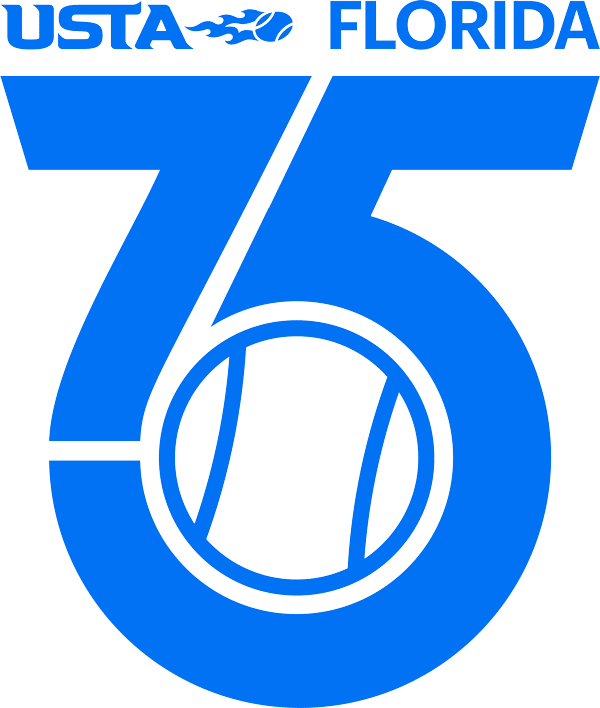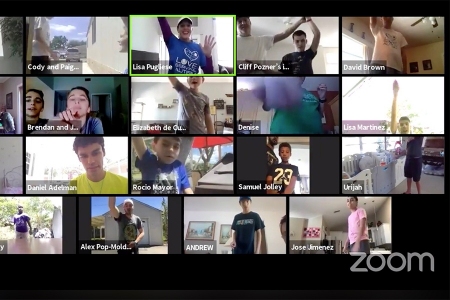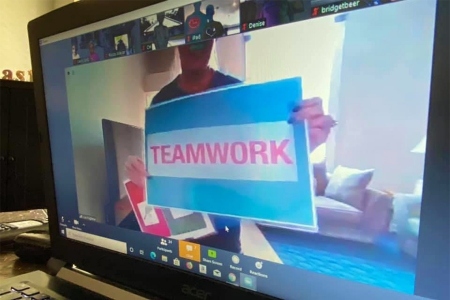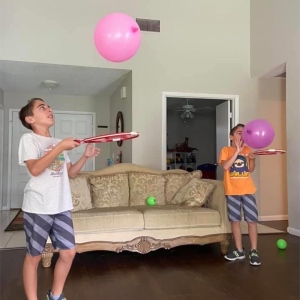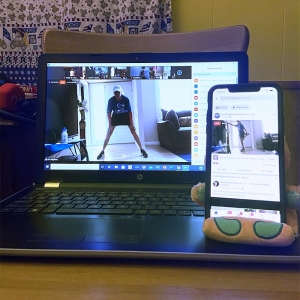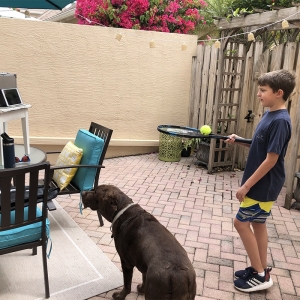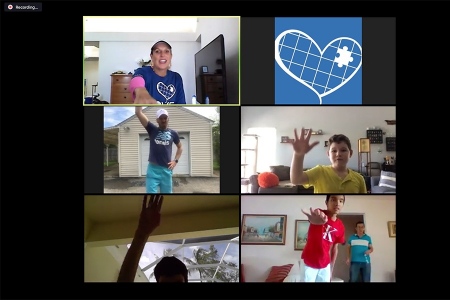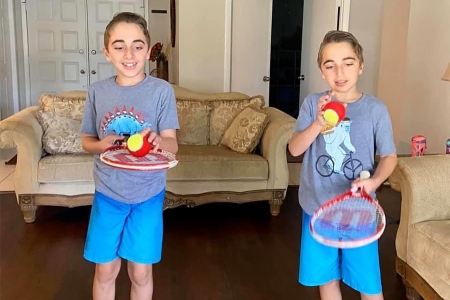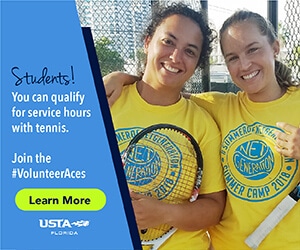“Tennis is an integral part of many LSA family’s weekly schedules.”
Love Serving Autism founder Lisa Pugliese has been working diligently to bring tennis to her athletes, because she knows the importance of their daily routines. Like many other organizations, LSA took the step to postpone in-person classes in mid-March due to COVID-19 and has followed guidance from the Centers of Disease Control and Prevention.
“We decided it was best to increase the safety and well-being of our program participants,” says Pugliese.
Love Serving Autism is a non-profit organization that provides specialized therapeutic programs with tennis instruction throughout Florida for children and adults with Autism Spectrum Disorders and developmental challenges. Pugliese, a speech-language pathologist who played college tennis at Duke University and the University of Florida, founded the organization in 2016 as a way to combine her love of tennis with her speech therapy experience.
“As the founder of Love Serving Autism, I learn more from the LSA program participants than what I could ever teach them,” she gushes. “They’ve taught me about perseverance, patience, unconditional love and finding my life’s purpose.”
Now in a time where social distancing and staying at home is encouraged, she wants to make sure program participants have the opportunity to stay active and engaged inside their living rooms.
“LSA created a plan to keep the program participants connected to adaptive tennis,” says Pugliese. “The goal was to implement additional structure and routine into their home life by teaching virtual tennis.”
Adapting LSA’s programming for virtual learning was an adjustment. The organization first selected teleconference software Zoom as the platform before creating a registration process. Another necessary modification was the tennis equipment used for the activities, as most participants didn’t have the racquets and tennis balls at home.
“For the virtual classes, we’re using dustpans and wooden spoons as tennis racquet replacements,” shares Pugliese. “Balloons, bean bags and small balls are being used in lieu of tennis balls.”
Pugliese says one of the biggest initial challenges to bringing these virtual trainings to life was encouraging families to try it out. While the online classes are presented differently as compared to LSA’s on-court classes, Pugliese’s visual schedule lays out what participants can expect – a modified, at-home version of the program.
“The online adaptive tennis classes include greetings, character development traits, warm-up exercises, stretching, hand-eye skills, stroke production and a group cheer,” explains Pugliese. “The program participants are very excited to participate, plus they get to see their tennis coach and friends.”
The organization’s goal for the virtual tennis classes is to bring joy and happiness to LSA families in a way that promotes health and fitness while providing an additional structured social and recreational activity for their routine. The weekly sessions engage participants by incorporating movement and maintaining a connection with tennis peers.
https://www.facebook.com/loveservingautism/videos/2881240271983086/?__xts__%5B0%5D=68.ARDJvtMKJ9clx_LX2Qegze9OrvHDpa7vNqBAV7w1CrEd9vDM3ZYBIyayRnZuKcy4qp8-8drQsXArL37H06R4gP2uvo-qDajsnCdrzUNhaJ8NVQONAQLaT7Qv2resKQvnz0wgsAICFUtwbf5DPi0KQsaY3BaXs4-mc486mUl9N0-QlwdNFbNZoA1HT11edI5f1ghLT5nYPFs4ZY7rpsaPfDyfe5ZVqatLpzByAoiOW2_oPsdWw75CwpwVTq_VrKuf15FvioC6eBRBXrqLyPTaFy13knshNOZLnTzQn6nxdBD2BjuyoT4kl0bsBQxqu9RMmevD0zAPQnT030JcCBbFYrHHXD2FyI3XrTmCcNdDLdHq9fMFsPoyJ-1fsDQ&__tn__=-R
“These virtual classes allow families to connect with the sport again and provide an essential fitness activity which increases overall well-being,” Pugliese says. “They also provide therapeutic instruction for gross motor, fine motor and communication skills for children and adults with autism and developmental challenges.”
Within a week of the program’s launch, 35 participants had registered for the online classes. Now, Pugliese says an average of 45 people are taking part, and even some United States Professional Tennis Association (USPTA) professionals have registered to learn more about adaptive tennis. Overall, the sessions have been well-received.
“The feedback we’ve gotten is that the sessions are fun, invigorating and are designed to connect the program participants, siblings and family members to adaptive tennis,” says Pugliese, who has now been teaching these online classes for a month. “I love seeing siblings join the classes because they feel empowered to make a difference.”
Pugliese says so far, these virtual classes have surpassed her expectations.
“Zoom has been an excellent platform for ‘adapting’ our Love Serving Autism tennis classes, so we may continue teaching tennis and keeping the families connected this amazing sport!”
She also encourages other tennis professionals and providers who are looking for more ways to connect with their athletes virtually, to give it a try.
“I think you would be pleasantly surprised how well tennis players love virtual tennis because we all miss the sport,” she says. “It is a wonderful way to stay connected while working on agility, footwork, endurance and technique to prepare you for your return to the tennis courts!”
USPTA and Professional Tennis Registry (PTR) certified tennis professionals who are interested in hosting an adaptive LSA virtual tennis class are welcome to contact the organization for virtual tennis training.
To learn more about Love Serving Autism, visit www.LoveServingAutism.org or check out the organization’s Facebook page.
For a schedule of upcoming Love Serving Autism virtual classes, click here.
